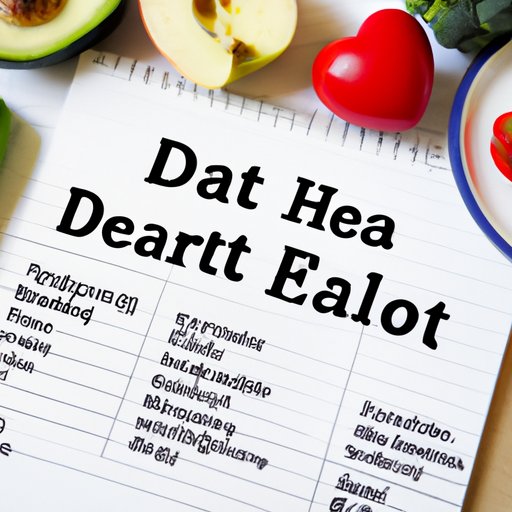
Introduction
Cardiovascular diseases, such as heart disease, are one of the leading causes of death globally. However, a cardiac diet can be beneficial in reducing the risk of developing heart-related issues. In this article, we will explore the benefits of a cardiac diet and provide valuable insights into incorporating it into one’s lifestyle successfully.
The Ultimate Guide to Understanding the Cardiac Diet and Its Benefits
A cardiac diet is a way of eating that aims to improve heart health by choosing foods that are low in saturated fat, trans fat, salt, and cholesterol. It emphasizes consuming plant-based foods, lean proteins, whole grains, and healthy fats.
Following the cardiac diet can provide several benefits, such as a reduced risk of heart disease, lower blood pressure, and cholesterol levels. It can also help an individual maintain a healthy weight, which is essential in controlling cardiovascular diseases.
Meal planning is an integral part of following a cardiac diet. It involves selecting foods based on their nutritional value, portion size, and cooking method.
Some meal ideas for a cardiac diet include baked salmon with roasted vegetables, quinoa salad with vegetables and chickpeas, and grilled chicken with a side of brown rice and steamed broccoli.
10 Foods You Need to Incorporate Into Your Cardiac Diet
Incorporating specific foods into a cardiac diet can further improve heart health. Here are ten foods that should be included in a cardiac diet:
- Salmon
- Spinach
- Walnuts
- Beans
- Oatmeal
- Blueberries
- Tomatoes
- Broccoli
- Avocado
- Dark Chocolate
Recipe ideas for incorporating these foods into meals include salmon and spinach salad, avocado toast, broccoli and kale soup, and oatmeal with blueberries and walnuts.

The Link Between Your Diet and Heart Health: Exploring the Cardiac Diet
The foods we eat can profoundly impact our heart health. For instance, foods high in saturated and trans fats can lead to high cholesterol levels, which increase the risk of heart disease and stroke. On the other hand, foods high in fiber, such as whole grains, nuts, and fruits, can lower cholesterol levels and keep the heart healthy.
Food components that are critical in improving heart health are omega-3 fatty acids, monounsaturated and polyunsaturated fats, and dietary fiber. These can be found in foods such as salmon, avocado, nuts, and whole grains.
How to Create a Meal Plan for a Successful Cardiac Diet
Effective meal planning can help to maintain a cardiac diet and achieve optimal heart health. The first step in creating a meal plan is to identify the foods that need to be incorporated while limiting those harmful to heart health.
It is beneficial to keep a food diary to monitor the foods consumed daily and their nutritional content. Measuring food or using portion control aids can help control the number of calories consumed. It’s also crucial to consume snacks in moderation and choose healthy snacks, such as fruit or nuts.
5 Surprising Foods that Can Worsen Your Cardiovascular Health
Despite the benefits of a cardiac diet, certain foods should be limited or avoided altogether. Five foods that are detrimental to heart health include:
- Soda and Sugary Drinks
- Processed Meats
- Trans Fats
- Salt
- Highly processed and packaged foods
Alternative food options include carbonated water with a citrus slice, lean proteins such as chicken and fish instead of processed meats, whole-grain or vegetable-based meals instead of processed foods, and herbs and spices in place of salt.
What You Need to Know About the Cardiac Diet: Expert Insights and Recommendations
Dr. Jane, a registered dietitian, says that a cardiac diet is beneficial for all individuals. It can help maintain heart health and reduce the risk of heart disease, especially for those who have a genetic predisposition to cardiovascular diseases. She adds that incorporating a few simple changes in an individual’s diet, such as limiting portions, reducing salt intake, and consuming healthy fats and whole grains, can have significant health benefits.
Conclusion
Adopting a cardiac diet can have tremendous benefits for an individual’s heart health. Consuming foods low in saturated and trans fats, cholesterol, and salt and high in dietary fiber, omega-3 fatty acids, monounsaturated and polyunsaturated fats can promote cardiovascular health. Meal planning, portion control, and incorporating snacks in moderation are essential elements in maintaining a successful cardiac diet. By following this diet, individuals can reduce their risk of heart-related diseases and achieve optimal heart health.





